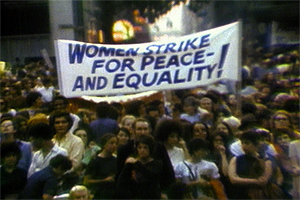MAKERS Asks (and Answers): Where Are the Women?

MAKERS, the influential three-hour documentary film and permanent on-line archive of women’s stories, came to be as the answer to a simple question: Where are the women?
Almost a decade ago, as filmmaker Dyllan McGee assessed her production company’s success at chronicling history—they had honored the Kennedys (Teddy: In His Own Words), remembered Lincoln (Looking for Lincoln), and helped African Americans find their roots (African American Lives)—she noticed a paucity of women’s perspectives. “I initially thought, ‘Surely a comprehensive documentary on the contemporary women’s movement exists—I just haven’t found it yet.’” When McGee’s research turned up little, she assembled an outstanding team, including Paula Kerger of PBS; Sharon Rockefeller, president of WETA, PBS's DC-area affiliate; and filmmakers Barak Goodman and Betsy West, and they worked for years to create a definitive film, initially envisioned as an “Eyes on the Prize for the women’s movement.”
The documentary, which premiered on PBS in February, is a comprehensive retrospective of the past 50 years of the women’s movement and a showcase of contemporary women’s voices on everything from race car driving to modern art. In addition, the Makers.com website, which launched a year before the documentary aired, features video profiles of women—some famous, many not so well-known—who have made a difference. By making women’s experiences central and showcasing the range of women who have been a part of this vast and life-changing movement, MAKERS offers both a flood of inspiration and a reminder that change can come from all parts of society.
McGee and her team characterize women profiled as “groundbreakers—women who have opened roles that were once the exclusive province of men; role models—women who inspire and lead by example; and activists—women who’ve played a role in the dramatic turning points of history.” They include journalist Christiane Amanpour; former secretary of state Condoleezza Rice; entertainers Ellen Degeneres and Diahann Carroll; Anu Bhagwati, founder of the Service Women’s Action Network; Christy Haubegger, founder of Latina magazine; and dozens more from the fields of sports, academia, politics, labor, youth advocacy, arts, media, economics, and more.
MAKERS has exceeded even McGee’s expectations: The documentary aired nationally on PBS to more than 2.6 million viewers. The website has had over 50 million video views (48 percent of those viewers are male). Well-known women might be the hook to attracting visitors to MAKERS, but what keeps them viewing longer are the heroic stories of women whose names are not in the history books, such as Barbara Burns, one of the nation’s first female coal miners, who won a long legal fight against sexual harassment; or Syracuse University student Kathrine Switzer, who “crashed” the Boston Marathon in 1967, laying the groundwork for women’s inclusion five years later; or pioneering molecular biologist Lydia Villa-Komaroff, who has done breakthrough research on diabetes treatment. The 200th profile (basketball star Lisa Leslie) was added to the site in August, and dozens of interviews will be uploaded in the coming months. Next up for MAKERS: six one-hour themed specials on PBS slated for summer and fall 2014—covering space, Hollywood, and comedy, among other topics; a book publishing partnership with Viking/Penguin; and MAKERS@, a conference tackling the complex topic of women and work.
In the almost two years that MAKERS has been live, the most common reaction in the thousands of responses that have arrived at Makers.com is some version of “I can’t believe I didn’t know that.” People report using MAKERS equally for the mundane and the monumental, whether explaining to kids who Billie Jean King is or trying to argue complex aspects of reproductive rights. The first-person narratives and the honesty rank highest in what people appreciate about the profiles. Fresh out of Stanford Law School, Sandra Day O’Connor applied for dozens of jobs in law firms, but was told each time, “We don’t hire women.” A young Oprah Winfrey asked early in her career why she was paid less than her male colleague for doing the same job. Sixteen-year-old Hillary Clinton wrote to NASA saying she wanted to go into space and was told, “We don’t take women.” In fact, the biggest shared attribute among the MAKERS might be their refusal to take no for an answer.
Like the women profiled, McGee knew that in order to bring her idea to fruition she wouldn’t be able to accept many nos. (In fact, only two women approached for the site have declined to be interviewed.) More than halfway into the documenting, McGee received the biggest yes—from AOL CEO Tim Armstrong: AOL would fund the rest of the project and permanently house the archives, enabling women’s stories to be re-told and re-told.
In the course of curating these stories, McGee realized how much her own life had been shaped by the very history she was trying to record. “As a kid I listened to Free to Be … You and Me; I idolized Mary Tyler Moore and Claire Huxtable, and by the time I was in my senior year of college I confidently reported that I would be the next Katie Couric,” she said, “until I learned I was bad on screen.” McGee was a product of her feminist generation—realizing a potential that wasn’t imaginable in past generations. And true to the spirit of MAKERS, she used her raised consciousness to ensure that never again could someone wonder: Where are the women?
To explore the documentary and the video profiles, go to Makers.com.



























